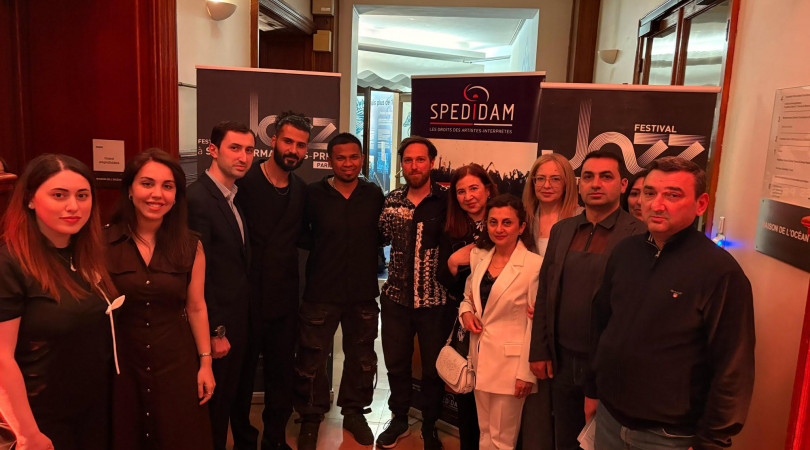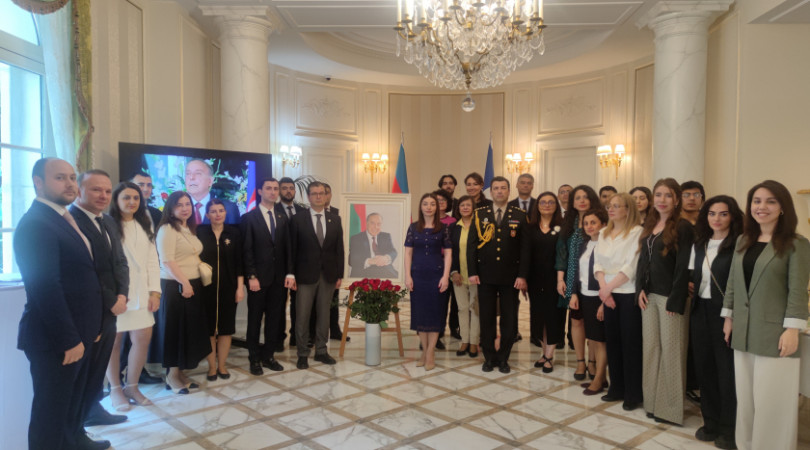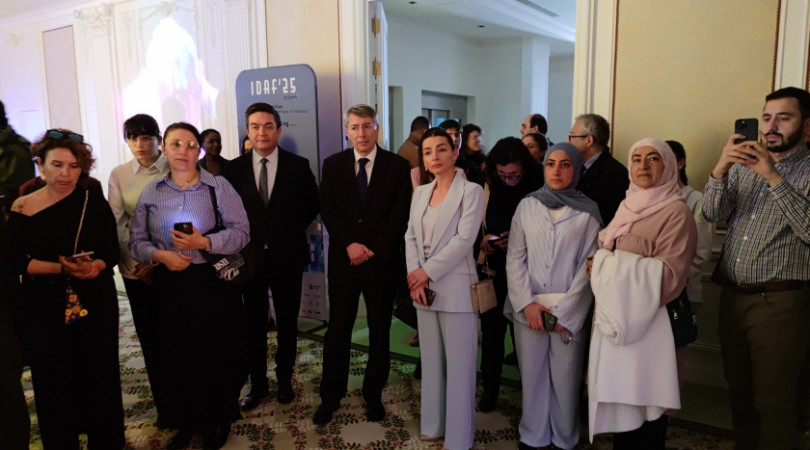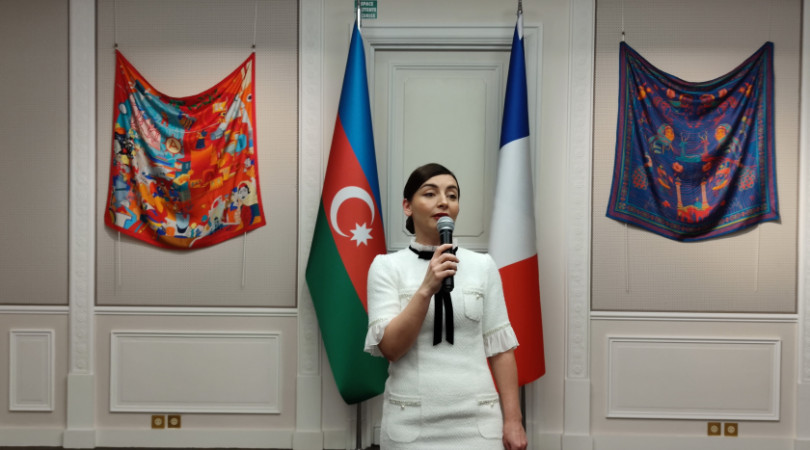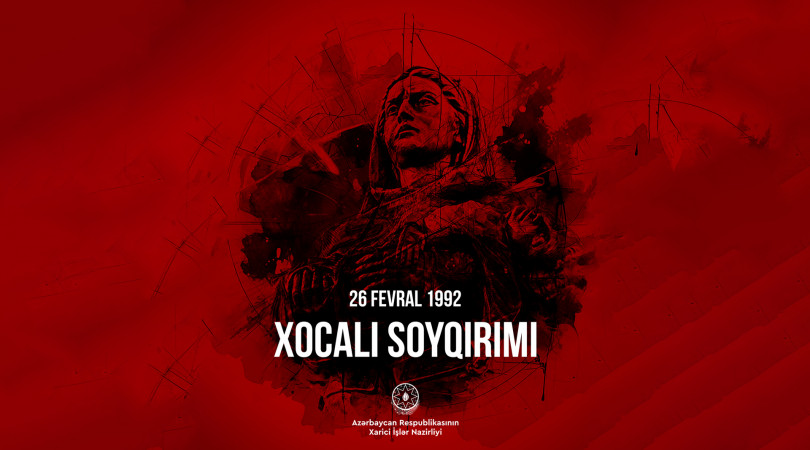Statement of the Commissioner for Human Rights (Ombudsman) of the Republic of Azerbaijan on the 25th anniversary of Khojaly Genocide
Twenty five years have already passed since the Khojaly genocide as an integral part of the Armenian aggressive and genocide policy against Azerbaijan resulted in severe and gross violation of international legal norms and principles, as well as of human rights and freedoms, that entered in the world history as a bloody tragedy. It is another evidence of long-lasting ethnic cleansing and genocide policy of the Armenian nationalists and their supporters against the Azerbaijani people.
At the night from the 25th to 26th February of 1992, the crime committed in Khojaly city by Armenian armed forces together with the 366th moto-artillery regiment of the former Soviet army dislocated in Khankendi must be recognized as genocide from the international law perspective. A lot of heavy military equipment of this regiment entered the city, the perpetrators annihilated with a special cruelty the people who were forced to leave the city in horror and razed the city, totally destroyed and burned down the houses and social infrastructure.
During the Khojaly genocide, 613 people, including 106 women, 63 children and 70 older people were killed; hundreds of people were severely injured; 1275 people were taken hostages. 8 families were totally exterminated, 25 children lost both, whereas 130 children lost one parent; captives and hostages were subjected to merciless torture. Human rights of those people, especially the fundamental right to life, were grossly violated.
As a result of ethnic cleansing policy of Armenia who expanded the scope of military aggression against Azerbaijan by perpetrating this tragedy and occupied Lachin, Kalbajar, Aghdam, Jabrail, Fuzuli, Gubadli, Zangilan rayons beyond the borders of Nagorno-Karabakh, which is integral part of Azerbaijan, 20,000 our citizens were killed, 20 percent of country territories were occupied.
This massive killing of human beings, committed by the Armenian invaders, unambiguously, is an act of genocide due to its unimaginable cruelty and tortures. Hence, under international law, genocide is considered to be one of the gravest crimes and the elements of this crime are determined in a number of legal documents. The UN General Assembly Resolution 96 (I) dated 11 December 1946, states that genocide, violating the right of people to life, damages human dignity, and deprives the mankind of the material and spiritual values created by human beings, is contrary to the spirit and aims of the United Nations, as well as to universal values and the world community condemns it.
The international legal definition of the crime of genocide was determined in the United Nations Convention on the Prevention and Punishment of the Crime of Genocide adopted by the Resolution 260 (III) of the UN General Assembly of 9 December 1948. The commitment of criminal acts, planned in advance and aimed at mass annihilation of people on the ground of their nationality in Khojaly constitutes this crime as genocide. During the aggression against Azerbaijan, all elements of the crime of genocide stated in the mentioned Convention were applied. However, unfortunately, though the commitment of such terrible acts of genocide against the Azerbaijani civilians, all these facts, including Khojaly genocide has not yet get its legal-political assessment, the planners, organizers and the committers of this crimes were not prosecuted and punished, no action has been taken.
Nagorno-Karabakh and adjacent seven regions are an integral part of Azerbaijan. This is re-affirmed once again by the international law, as well as by the UN Security Council Resolutions 822, 853, 874, 884 from 1993, UNGA Resolution on “Situation on the occupied territories of Azerbaijan” dated on 14 March, 2008, Resolution 1416 from 2005 and Recommendation 1669 from 2009 of the Parliamentary Assembly of the Council of Europe confirming the occupation of Azerbaijani territories by the Armenian military forces, and governing of Nagorno-Karabakh by separatist regime. As a consequence, over one million of the Azerbaijani people became refugees and internally displaced persons (IDPs), whose fundamental rights and freedoms were severely violated.
Armenia, being accepted as a member to the Council of Europe, has undertaken several international obligations according to the Opinion No. 221 of the Parliamentary Assembly, such as to pursue efforts to settle the Nagorno-Karabakh conflict by only peaceful means; according to the principles of international law to settle international and local disputes also by peaceful means by resolutely rejecting any use of force and threatening against its neighbours. However, those obligations have not been fulfilled; the Armenian side regularly violates the ceasefire regime and creates obstacles to the peace in the region demonstrating unconstructive position.
Since 2 April 2016, the group of Armenian armed forces abruptly started intensive shootings from the occupied Azerbaijani territories, as well as from the territory of the Republic of Armenia on the territories of the Republic of Azerbaijan, numerous dwellings, schools and other social objects along the frontline, also the positions of the Azerbaijani Armed Forces troops on the line of contact, by heavy artillery and big caliber weapons. As a result, civilians, including women and children were killed and severely injured. Thus, international legal documents, including the provisions of the Geneva Conventions were grossly violated as a result of these provocations. This was observed by the representatives of international organizations and international journalists visiting our country.
The European Parliament Resolution of 23 October, 2013 on Nagorno-Karabakh also re-affirms the support of just position of our State by the international community and the fact of occupation. This document denotes once again the importance of the settlement of the Nagorno-Karabakh conflict in conformity with the UN Security Council relevant Resolutions of 1993 that requires immediate, unconditional and total withdrawal of all occupant forces out of the territories of Azerbaijan. Regrettably, no relevant actions have been taken yet and the historical territories of Azerbaijan are still under the occupation.
Recently in the 9th paragraph of Resolution adopted following the presentation of the Head of Ukrainian delegation, the Head of Committee on Culture, Science, Education and Media Vladimir Aryev on “Attacks on journalists and freedom of media in Europe” delivered in plenary session of PACE, the fact that Nagorno-Karabakh belongs to Azerbaijan has been once more confirmed. The document stresses the separatist essence of regimes keeping under control such areas and calls these areas completely opaque zones where lawlessness reigns.
Our National Leader Heydar Aliyev unveiled the essence of Khojaly genocide and in February, 1994, the Parliament of the Republic of Azerbaijan gave legal and political recognition to this crime.
The President of the Republic of Azerbaijan, Ilham Aliyev underlines resolutely the necessity of this conflict resolution only in the frame of territorial integrity of the country, as well as emphasizes the necessity of withdrawal of occupant forces from the Azerbaijani territories and prosecution of perpetrators of the genocide.
According to the Order of the President of the Republic of Azerbaijan on the 25th Anniversary of Khojaly Genocide, plan of actions was approved and actions are being implemented.
“Justice for Khojaly” international campaign initiated by Leyla Aliyeva, the Vice-President of the Heydar Aliyev Foundation, is one of the purposeful measures taken for dissemination in the world of the true information about the Khojaly genocide and recognition of this tragedy as an act of genocide committed against the people of Azerbaijan. Thus, relevant decisions are being made on this genocide act in several countries.
Within last years, the genocide policy of Armenia against Azerbaijan is condemned all over the world; bloody crime committed in Khojaly is getting recognized in compliance with the norms of international law.
To the point, the Parliaments of Mexico, Columbia, Peru, Pakistan, Bosnia and Herzegovina, Romania, the Czech Republic, Sudan, Jordan and Honduras, Guatemala and Panama, Slovenia and Djibouti already recognized the crime in Khojaly as genocide from the perspective of the international legal norms.
In addition, twenty one States of the USA namely, the State of Massachusetts, Texas, New-Jersey, Maine, New Mexico, Arkansas, Georgia, Oklahoma, Tennessee, Pennsylvania, Connecticut, Florida, Mississippi, West Virginia, Indiana, Utah, Nebraska, Hawaii, Montana and Arizona have already also passed the related Resolutions.
The Organization of Islamic Conference (OIC) was the first international organization that recognized Armenia as an aggressor and the Khojaly tragedy as genocide. So, the aim of the Campaign “Justice for Khojaly” organized by the Youth Forum of OIC, which carried out in over 40 countries of the world, is also to make the international community aware about this bloody event.
However, it makes indignant and regretful that legal-political assessment has not yet been given to the Khojaly genocide at the international level.
Moreover, activists of the both countries made a common decision and created Armenian-Azerbaijan Peace Platform. The platform aims at peaceful resolution of Armenian Azerbaijan Nagorno-Karabakh conflict in accordance with international law principles.
In the days of the 25th anniversary of the Khojaly tragedy paying tribute to the memory of martyrs I declare that this crime shall be investigated by the special international commission and recognized as an act of genocide and sanctions shall be imposed on the perpetrators of this crime in compliance with the norms and principles of international law and without double standards. I urge the respected international organizations to condemn this act of genocide and to increase efforts for just punishment of the offenders of this crime as soon as possible.
We do once again declare that the Armenian side should fulfil the decisions following from the international legal documents on this conflict, restore the territorial integrity of Azerbaijan, liberate the Azerbaijani captives and hostages, also restore the violated rights of refugees and IDPs who shall be returned to their homes. The criminals who killed innocent people and committed genocide should be soon prosecuted and punished before the tribunal.
Elmira Suleymanova
The Commissioner for Human Rights
(Ombudsman) of the Republic of Azerbaijan
01.02.2017
The Statement is addressed to the Secretary-General of the United Nations, United Nations Security Council, United Nations High Commissioner for Human Rights, UNESCO, Organization of Islamic Cooperation European Commission, Council of Europe, OSCE, International and European Ombudsman Institutes, Asian Ombudsman Association, International Peace Bureau, ombudsmen of different countries, embassies of the Republic of Azerbaijan abroad, as well as the foreign embassies in Azerbaijan, and organizations of the Azerbaijani Diaspora

